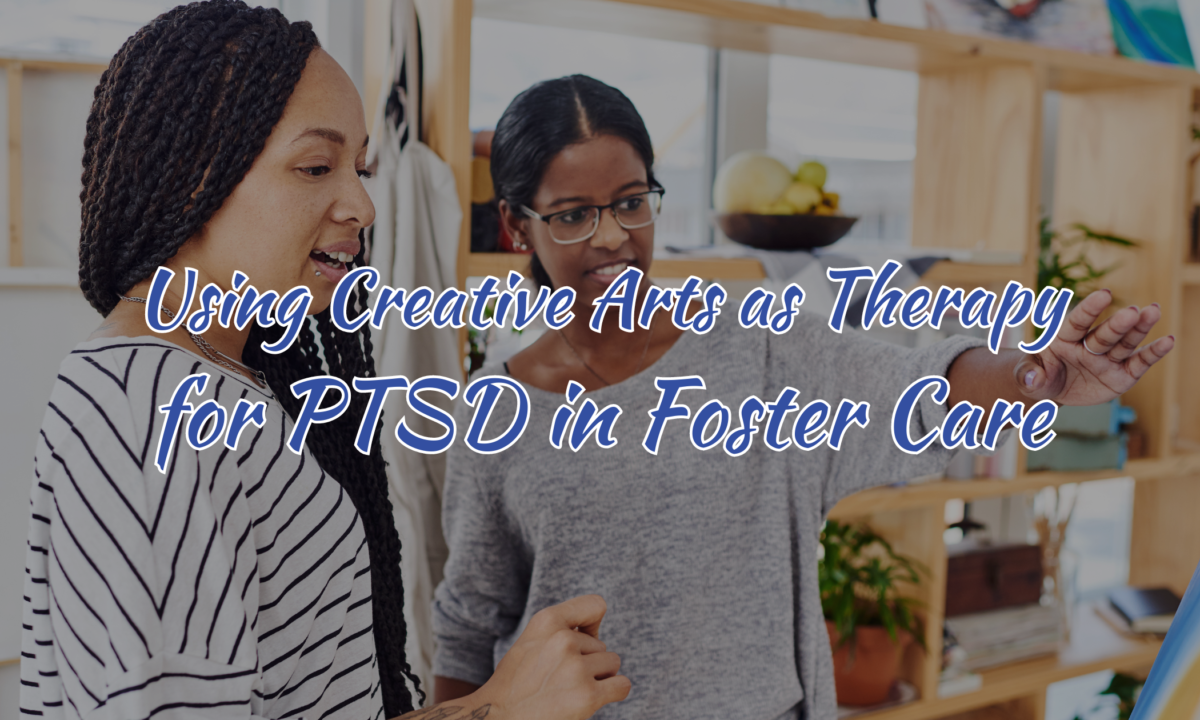June, recognized as National PTSD Awareness Month, serves as a poignant reminder of the pervasive impact of Post-Traumatic Stress Disorder (PTSD) on many lives, including children in or exiting the foster care system. These children often endure traumatic experiences, leading to significant emotional and psychological challenges.
Traditional therapeutic approaches are vital, but integrating creative arts therapy can provide a powerful and healing supplement. Keep reading as we explore the role of creative arts as therapy for PTSD in foster care, highlighting its benefits and practical applications for Sunnybrook residents.
The Power of Creative Arts Therapy
Creative arts therapy encompasses various forms of artistic expression, including visual arts, music, dance, drama, and writing. These therapies offer unique avenues for self-expression, emotional release, and healing, especially for children who may struggle to articulate their feelings verbally.
- Music Therapy: Listening to, creating, or performing music can soothe anxiety, elevate mood, and provide a sense of control and accomplishment. Music therapy can also help foster children express difficult emotions they might not have words for.
- Dance or Movement Therapy: Physical expression or movement and dance allow children to express themselves physically, release tension, and reconnect with their bodies in a positive way. It can be particularly beneficial for those who have experienced physical abuse or neglect.
- Drama Therapy: Drama therapy uses role-playing, storytelling, and theatrical techniques to help children explore their experiences, build empathy, and gain new perspectives on their trauma.
- Writing Therapy: Journaling, and other forms of expressive writing can help children process their thoughts and feelings, gain clarity, and find a voice for their experiences. Like music and other forms of therapy, writing can help children find the words for difficult emotions and provide them with an outlet during troubling times.
- Visual Arts Therapy: Involves using drawing, painting, sculpting, and other art forms to express emotions and process trauma. It helps children externalize their feelings, making them more manageable and less overwhelming. Currently, our residents are helping us create butterfly seashells to go along with our theme of ‘Beautiful Transformations’.

Benefits of Creative Arts Therapy for Transitional Residents at Sunnybrook
Many children in or aging out of foster care have difficulty expressing their trauma verbally, either due to a lack of trust or simply not knowing how to express their emotions and how they’re feeling in an appropriate manner.
- Non-Verbal Expression: Creative arts provide alternative means of expression, helping them communicate complex emotions and experiences without relying solely on words.
- Emotional Release and Regulation: Engaging in creative activities can serve as a cathartic release, reducing anxiety, depression, and stress. These activities can also help children develop better emotional regulation skills.
- Building Self-Esteem and Confidence: Completing an art project or performing in front of others can boost a child’s self-esteem and confidence. It provides a sense of achievement and fosters a positive self-identity.
- Creating Safe Spaces: The creative process can create a safe and controlled environment where children feel secure to explore their emotions and experiences.
- Enhancing Social Skills: Group art projects or performances encourage collaboration, communication, and social interaction, helping children develop better social skills and build positive relationships.
Implementing Creative Arts Therapy in Sunnybrook Homes
By integrating these therapies into transitional programs and daily practices, Sunnybrook provides young adults with valuable tools for self-expression, healing, and personal growth. From professional guidance to dedicated spaces built to showcase their creativity, our residents are supported on an individual level based on each of their unique needs and recovery pathways as they strive to become strong and independent adults.
- Professional Guidance: Professional counselors and houseparents engage in art, music, and other creative arts with school professionals and others who specialize in trauma-informed care. This love, stability, and expertise ensure that activities are conducted in a safe, therapeutic environment.
- Integrating into Daily Routines: Sunnybrook houseparents and caregivers integrate creative arts activities into daily routines. Simple activities like drawing, crafting, or playing music are monitored and incorporated into everyday life.
- Creating Dedicated Spaces: Specific common areas in our homes and spaces on Sunnybrook’s campus are reserved for creative expression. These places are inviting, safe, and equipped with various supplies and resources for residents.
- Encouraging Participation: At Sunnybrook, we encourage children to participate in community art programs, school art clubs, or creative activities with other residents. These programs can provide additional resources and support.
- Combining Therapies: Combining creative arts therapy with other therapeutic approaches, and professional counseling services such as cognitive-behavioral therapy (CBT) or trauma-focused cognitive-behavioral therapy help provide a comprehensive treatment plan and a path for healing.
Fostering Beautiful Transformations Through Hope and Resilience
National PTSD Awareness Month is an opportunity to explore diverse and innovative approaches to healing trauma. For children aging out of foster care, the transition can mark a difficult and unsettling period in their lives. Creative arts and professional therapy services offer a transformative and accessible means of coping with and overcoming PTSD.
As we continue to raise awareness and support for PTSD, let us remember the power of creativity in fostering resilience and hope. If you’d like to get involved and support Sunnybrook’s incredible work counseling foster teens who are experiencing PTSD, follow this link to fill out a request form or call us today at (601) 856-6555.
If you’d like to leave your impact by donating today, Mississippi State tax credits are available now through December 31, 2024. Visit www.sunnybrookms.org/donate, click the dropdown menu to select the Sunnybrook program or area of ministry you’d like to support and hit submit!
For more information or to learn how you can claim a dollar-for-dollar tax contribution on your next tax return, please contact Ron Veazey, Director of Advancement, at (601) 227-4221 or by emailing info@sunnybrookms.org.

